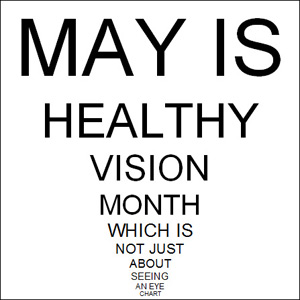Editor's note: The National Eye Institute (NEI) has proclaimed May as Healthy Vision Month.— and the National Eye Institute (NEI) needs your help to Make Vision a Focus!
Did you know more than 23 million American adults have never had an eye exam? Getting regular eye exams can catch vision problems early, when they may be easier to treat. That’s why NEI is interested in making vision health a priority, by encouraging adults to take action to protect their vision and inspiring health professionals to continue teaching the importance of vision care.
In conjunction with this month, Dr. Alan Mendelsohn, F.A.C.S, has written a post on preventing the loss of sight. Following the American Foundation for the Blind's "Second National Conversation on Aging and Vision Loss", Dr. Mendelsohn asked if he could contribute an article, saying, "I see too many patients who face the serious risk of blindness simply due to a lack of awareness."
Dr. Mendelsohn has practiced for 30 years. He attended Northwestern University’s Honors Program in Medical Education and Northwestern University Medical School, where he also completed his residency training in Ophthalmology. He completed a Fellowship at the Bascom Palmer Eye Institute. While practicing in South Florida, Dr. Mendelsohn has been actively engaged in organized medicine at the local, state, and national levels. He served as President of the Florida Society of Ophthalmology in 1996 and has assumed leadership roles for two decades in that organization’s public policy efforts. Further, Dr. Mendelsohn has developed and enhanced laser procedures for glaucoma and cataract surgery, and has published his work in prestigious scientific publications.
Be Proactive About Your Vision
by Dr. Alan Mendelsohn, F.A.C.S.
What Is the Best Way to Prevent Sight Loss?
Dispensing medical advice is a something ophthalmologists love to do. Patients are not always receptive to our words of caution and tend to be more responsive when we dispense medications. I don’t take it personally. My favorite piece of advice to my patients is limited to two words: be proactive.
While there are many medical diseases which are genetic and outside of our control, there are things we can personally do to limit or prevent diseases which affect the eyes.
Macular Degeneration
Let’s start with macular degeneration, the principal cause of vision loss among older people in the United States. More than 10,000,000 individuals are affected by this progressive ocular disease. But if you are proactive, there are ways you can mitigate the process and preserve your eyesight.
Steps to Being Proactive About Your Vision
- The first step is to stop smoking. Research has proven smokers have a stronger probability of being diagnosed with macular degeneration than nonsmokers. Smoking can cut off the oxygen supply to the macular, which is the central part of the retina. And while we all lose pigment as we age due to environmental toxins such as ultraviolet light, smoking accelerates the process.
- A second recommendation is to buy eyeglass lenses with blue blocker. 95% of Americans spend more than two hours a day on their cell phone, computer, iPad, or other digital devices. We are also exposed to blue light from the sun and fluorescent light bulbs. The result is eye fatigue and possible macular degeneration. By purchasing lenses with blue blocker, the damage is minimized.
- The third step is to wear sunglasses during daylight hours, even when driving your car. Please keep in mind not all sunglasses are created equal. The only sunglasses which offer proper protection have U-400 blocker and are polarized on both sides of the lenses.
- A fourth proactive step is to add foods rich in alpha omega-3 fatty acids to your diet. Walnuts, flaxseed oil, and many types of fish such as salmon, mackerel, herring, and snapper are good dietary sources.
- My final recommendation is to take AREDS 2 Vitamin supplementation. My patients love advice in the form of pills. They contain six active ingredients including lutein, zeaxanthin, Vitamin C, Vitamin E, zinc, and copper. According to a study sponsored by the National Eye Institute, taking high levels of antioxidants and zinc can reduce the risk of developing advanced age-related macular degeneration by about 25%. However, be sure to talk to your doctor before taking this vitamin as the AREDS formula is not recommended for persons who have not been diagnosed with macular degeneration because it contains a high dose of zinc.
Importance of the Annual Eye Exam
Your annual eye exam is also an extremely important proactive measure. People typically see their eye doctors hoping to improve their eyesight. What they often don’t realize is more than 200 major, systemic diseases have eye involvement as part of the disease course.
Diabetes
Diabetes is one of the common diseases diagnosed during an annual eye exam and according to NEI, the leading cause of blindness in the United States. I could not possibly count the number of patients I have seen who have left my office with my recommendation to see an endocrinologist. Patients with thyroid abnormalities such as Graves’ disease sometime present with exophthalmos, a bulging of the eyeball. Rheumatoid arthritis, lupus, multiple sclerosis, Lyme disease, sickle cell, anemia, and even breast cancer often can be identified during your annual visit.
Ophthalmologists are perfectly positioned to be able to identify these illnesses before anyone else and refer patients to appropriate treatment before symptoms develop or progress.
Routine eye examinations definitely help preserve and improve vision, but more importantly, they often save lives.
